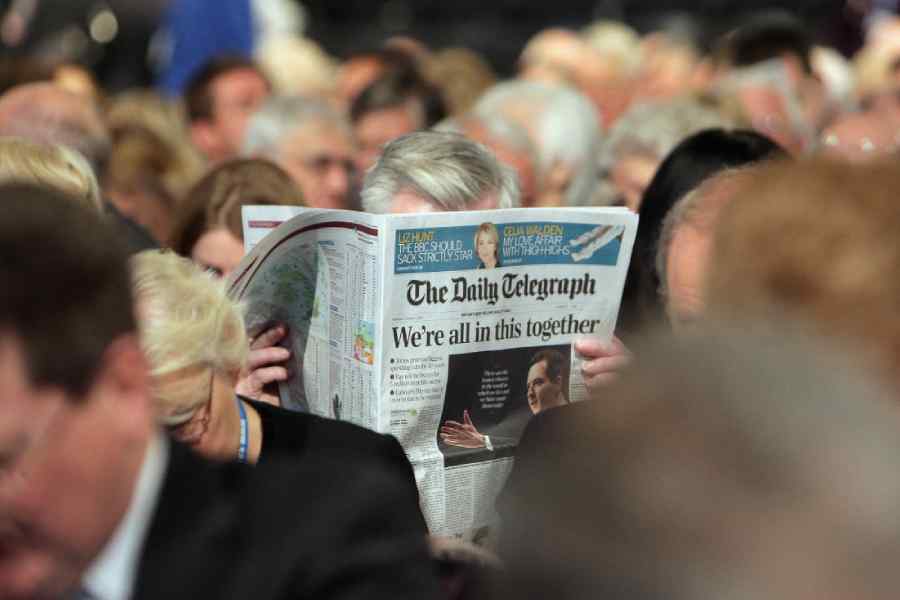Foreign hand
A campaign is underway to stop The Daily Telegraph, The Sunday Telegraph and The Spectator from being taken over by Sheikh Mansour bin Zayed Al Nahyan, a member of Abu Dhabi’s ruling family. Lord Charles Moore, who has edited all three titles, has argued: “The Telegraph and the Spectator are great British institutions. They should not be controlled by a foreign power.” Suzanne Moore, a Telegraph columnist, has also opposed the sale to the owner of the Manchester City football club. She has written that “Emirati culture is entirely different to ours in profound ways.”
There is nothing new about foreigners buying British national newspapers. Roy Thomson (he bought The Times and The Sunday Times), William Max Aitken (he had the Daily Express and was a minister in Churchill’s war cabinet) and Conrad Black (he had the Telegraph group before he was convicted of fraud) were all Canadians. Evgeny Lebedev, who owns the London Evening Standard, is the son of a Russian KGB officer. All received peerages. And Rupert Murdoch, who now owns The Times, The Sunday Times and The Sun, is Australian.
Ownership of the Telegraph group reverted to the Barclay family after it paid off a loan of £1.15 billion from the Lloyds Banking Group. The money has come from RedBird IMI, a joint venture between RedBird, an American private equity firm headed by Jeff Zucker, the former CNN boss, and International Media Investments, an Abu Dhabi vehicle backed by Sheikh Mansour. The sale is on hold — for now — after the culture secretary, Lucy Frazer, issued a public interest intervention notice.
Lessons learnt
It might be a cliché to say that we should learn from our mistakes but this year’s Financial Times Business Book of the Year was won by Right Kind of Wrong: Why Learning to Fail Can Teach Us to Thrive by Amy Edmondson, a Harvard professor, who is apparently “the world’s most influential organisational psychologist”. The author “tells vivid stories ranging from the history of open heart surgery to the Columbia Space Shuttle disaster, all to ask a simple, provocative question: what if it is only by learning to fail that we can hope to truly succeed?”
The event was held on Monday at an elegant venue, the Claridge’s Hotel in London. The FT, owned incidentally by Nikkei of Japan, has become a very successful venture by attracting online subscribers from across the world. It has certainly had a go at Gautam Adani over the past year. I was rooting for Cobalt Red: How the Blood of the Congo Powers Our Lives by Siddharth Kara, an Indian-origin author from America now based at Nottingham University, who was sitting at my table. The shortlist also included Elon Musk by Walter Isaacson which has been in the supermarkets for weeks and will sell well for Christmas. In a separate exercise, the FT picked Bollywood actress Alia Bhatt among its 25 “most influential women of 2023”.
Rich and famous
Srichand Hinduja, who passed away earlier this year, told me back in 2000 that he was bidding to buy the Daily Express. But I don’t think he was serious because he allowed himself to be outmanoeuvred by Richard Desmond, whose assets included adult TV channels and magazines. This year the British Asian Rich List is headed by the Hindujas, as has been the case for several years. Gopi Hinduja and his brothers are said to be worth £33.5 billion, making them the richest family in the United Kingdom. Second are the steel tycoon, Lakshmi Mittal, and his son, Aditya, with £12.9bn.
What I find interesting is what the rich do with their money. Quite a few have bought apartments in Dubai, which has the advantage of being barely “two hours from Bombay”. Yogesh Mehta has put his money into art. He has over a hundred MF Husains, a Camille Pissarro and a self-portrait by Amrita Sher-Gil. What is remarkable is the number of families with Calcutta connections, such as Nirmal Sethia, who has given millions to fund robotic surgery in memory of his late wife, Chitra. Sri Prakash Lohia, of Indorama, was born in Calcutta and has spoken, modestly, of “Marwari acumen” in his book.
Blood ties
PG ‘Plum’ Wodehouse’s step-great-grandson, Hal Cazalet, discovered some family connections during his recent “most wonderful tour” of Goa, Pune, Mumbai and Bangalore. In Pune, “I learned that Plum’s elder brother, Ernest Wodehouse, was the tutor of [the philosopher] Jiddu Krishnamurti,” he says. Another revelation was that “my ‘blood’ great-grandfather, that is Leonora’s father — Ethel having been widowed before she met Plum — was buried just outside Bangalore!”










